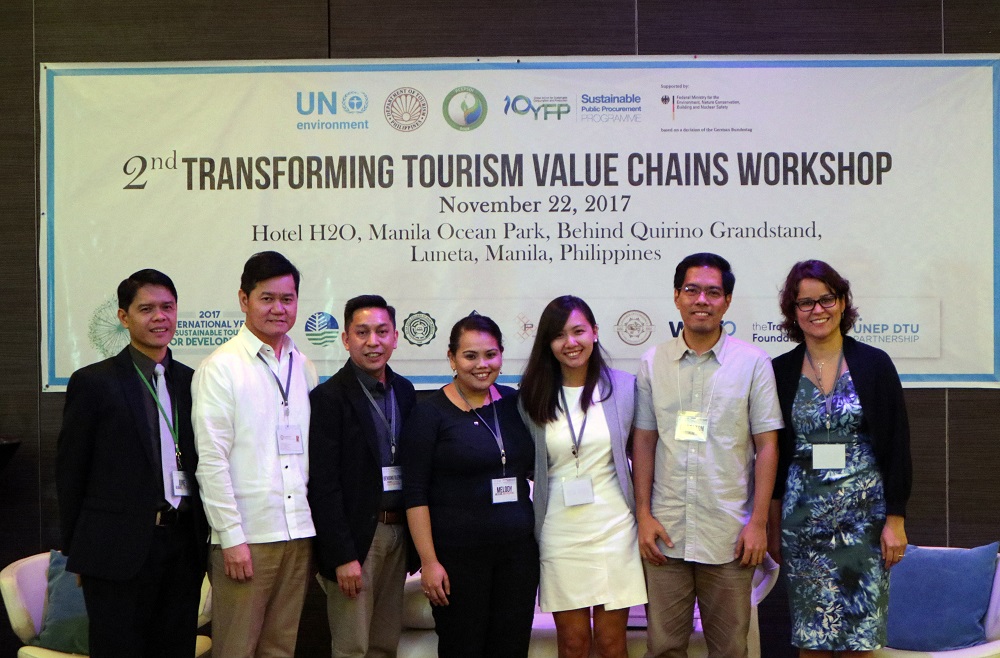Transforming Local Tourism Value Chains through Sustainable Consumption and Production
November 2017
Members of the World Wide Fund for Nature (WWF) Philippines’ The Sustainable Diner: A Key Ingredient for Sustainable Tourism project team were invited to attend the 2nd Conference and Workshop on Transforming Tourism Value Chains in Developing Countries and Small Islands and Developing States (SIDS) to Accelerate More Resource Efficient, Low Carbon Development Projects last November 22, 2017 at Hotel H2O in Manila City. Hosted by the Philippine Center for Environmental Protection and Sustainable Development, Inc. (PCEPSDI), in partnership with the UN Environment Programme, Waste & Resources Action Programme (WRAP), the UNEP-DTU Partnership, and the Department of Tourism, the second leg of the workshop aims to consolidate best practices from the government, the private sector, and civil society, and to come up with industry and community-based solutions in order to promote low carbon and sustainable development in the tourism industry.
During the first leg of the workshop, Department of Tourism (DOT) Secretary Wanda Teo validated the need for a long-term tourism strategy which will adopt sustainable consumption and production principles in order for the Philippines to achieve green economic growth. A key development pillar that generates high economic gains for the country, tourism contributed 8.2% to the GDP last 2016. Secretary Teo has made it a priority initiative for the department to move towards greening the local tourism industry and incorporating the necessary environmental standards. The four-year project funded also by the Federal Ministry for the Environment, Nature Conservation, Building and Nuclear Safety (BMUB) and the International Climate Initiative (IKI) Programme has targeted two key tourism zones in the country: Metro Manila and Iloilo City.
Ms. Melody Melo-Rijk, Project Manager of Sustainable Consumption and Production in the Philippines, was invited as panel speaker for the Key Private Sector Actors Driving GHG/RE Action panel discussion, where she shared details and initial achievements of The Sustainable Diner project and how sustainable dining is a key ingredient towards achieving a sustainable tourism industry here in the Philippines – an industry heavily-dependent not just on our country’s natural beauty, but also our unique local cuisine and rapidly-growing dining scene.
“Filipinos love food, and this love for food is seen not just in our daily lives but also whenever we travel. Food is a big part of what makes traveling very memorable for us, which is why The Sustainable Diner project was created in the first place – to address the need to implement sustainable consumption and production practices in the local dining scene,” says Ms. Melo-Rijk. “Our long-term plan for making the local tourism industry more environment-friendly should take into account the contribution of the food service industry, so that together we can come up with holistic solutions towards greening and improving our present system, especially on the issue on food waste. Furthermore, we want to revolutionize the food service industry in gearing them towards sustainability and to also serve as catalyst to spread awareness to diners.”
The Sustainable Diner project, under WWF-Philippines’ Sustainable Consumption and Production, is part of the International Climate Initiative (IKI). The Federal Ministry for the Environment, Nature Conservation, Building and Nuclear Safety (BMUB) supports this initiative on the basis of a decision adopted by the German Bundestag.

Key Private Sector Actors panel members together with representatives from PCEPSDI, DOT, and UNEP.
© Gabriel Villalon / WWF-Philippines
